人教版英语英语情态动词总结和练习含答案百度文库
英语情态动词含答案解析
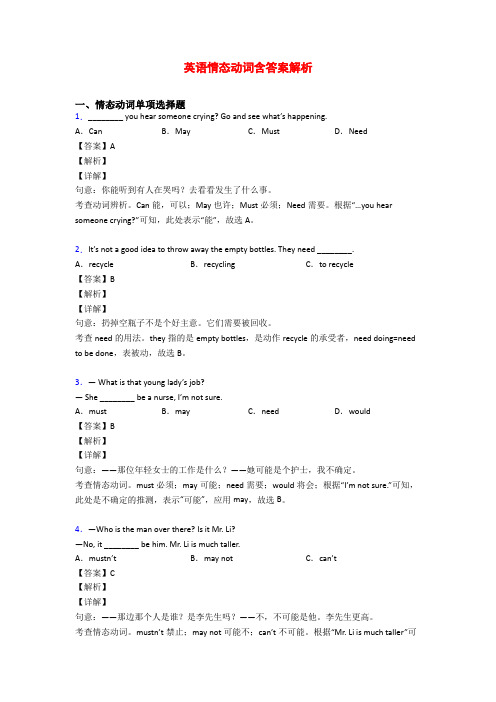
英语情态动词含答案解析一、情态动词单项选择题1.________ you hear someone crying? Go and see what’s happening.A.Can B.May C.Must D.Need【答案】A【解析】【详解】句意:你能听到有人在哭吗?去看看发生了什么事。
考查动词辨析。
Can能,可以;May也许;Must必须;Need需要。
根据“…you hear someone crying?”可知,此处表示“能”,故选A。
2.It’s not a good idea to throw away the empty bottles. They need ________.A.recycle B.recycling C.to recycle【答案】B【解析】【详解】句意:扔掉空瓶子不是个好主意。
它们需要被回收。
考查need的用法。
they指的是empty bottles,是动作recycle的承受者,need doing=need to be done,表被动,故选B。
3.—What is that young lady’s job?— Sh e ________ be a nurse, I’m not sure.A.must B.may C.need D.would【答案】B【解析】【详解】句意:——那位年轻女士的工作是什么?——她可能是个护士,我不确定。
考查情态动词。
must必须;may可能;need需要;would将会;根据“I’m not sure.”可知,此处是不确定的推测,表示“可能”,应用may,故选B。
4.—Who is the man over there? Is it Mr. Li?—No, it ________ be him. Mr. Li is much taller.A.mustn’t B.may not C.can’t【答案】C【解析】【详解】句意:——那边那个人是谁?是李先生吗?——不,不可能是他。
人教版七年级上册情态动词专项训练(含答案)
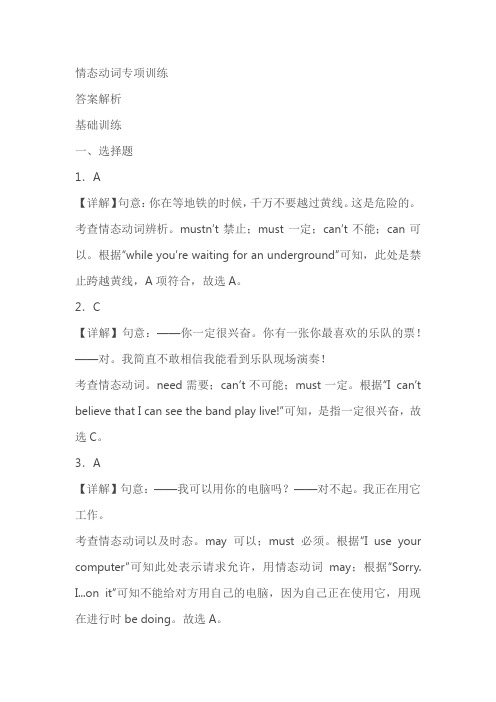
情态动词专项训练答案解析基础训练一、选择题1.A【详解】句意:你在等地铁的时候,千万不要越过黄线。
这是危险的。
考查情态动词辨析。
mustn’t禁止;must一定;can’t不能;can可以。
根据“while you’re waiting for an underground”可知,此处是禁止跨越黄线,A项符合,故选A。
2.C【详解】句意:——你一定很兴奋。
你有一张你最喜欢的乐队的票!——对。
我简直不敢相信我能看到乐队现场演奏!考查情态动词。
need需要;can’t不可能;must一定。
根据“I can’t believe that I can see the band play live!”可知,是指一定很兴奋,故选C。
3.A【详解】句意:——我可以用你的电脑吗?——对不起。
我正在用它工作。
考查情态动词以及时态。
may可以;must必须。
根据“I use your computer”可知此处表示请求允许,用情态动词may;根据“Sorry.I...on it”可知不能给对方用自己的电脑,因为自己正在使用它,用现在进行时be doing。
故选A。
【详解】句意:——我们必须帮助他完成工作吗?——不,不必,他可以自己完成工作。
考查情态动词。
must表示“必须”,用must提问时,其否定回答用needn’t或don't have to。
can表示“可以,能够”,表示不必帮他,他能自己完成工作,故选C。
5.B【详解】试题分析:句意,北京的医生们尽他们最大的努力救杭州市长的性命,但是他还是死于心脏病,享年58岁。
do all sb can to do,did all sb could to do ,是尽某人所能去做某事的意思,故选择B。
考点:考查情态动词。
6.C【详解】句意:——托尼,我们课上能戴帽子吗?——不,我们不能。
考查情态动词。
must必须;have to不得不;can能;need需要。
根据回答“No, we can’t”可知,此处是问“能戴帽子吗”,用情态动词can。
情态动词练习(含答案)
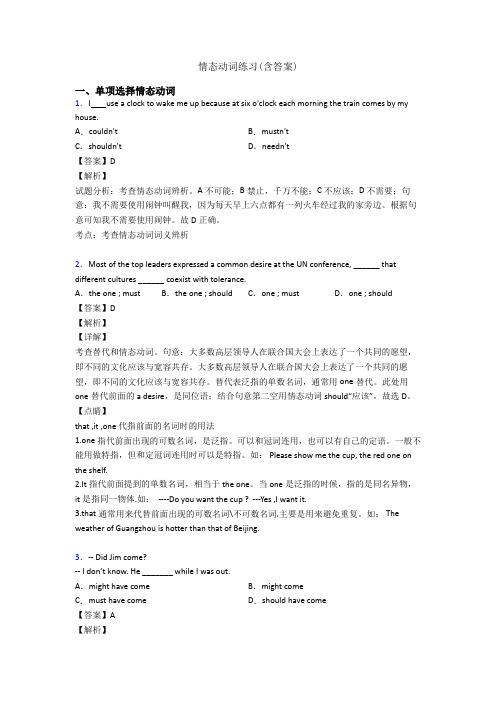
情态动词练习(含答案)一、单项选择情态动词1.I use a clock to wake me up because at six o'clock each morning the train comes by my house.A.couldn't B.mustn'tC.shouldn't D.needn't【答案】D【解析】试题分析:考查情态动词辨析。
A不可能;B禁止,千万不能;C不应该;D不需要;句意:我不需要使用闹钟叫醒我,因为每天早上六点都有一列火车经过我的家旁边。
根据句意可知我不需要使用闹钟。
故D正确。
考点:考查情态动词词义辨析2.Most of the top leaders expressed a common desire at the UN conference, ______ that different cultures ______ coexist with tolerance.A.the one ; must B.the one ; should C.one ; must D.one ; should【答案】D【解析】【详解】考查替代和情态动词。
句意:大多数高层领导人在联合国大会上表达了一个共同的愿望,即不同的文化应该与宽容共存。
大多数高层领导人在联合国大会上表达了一个共同的愿望,即不同的文化应该与宽容共存。
替代表泛指的单数名词,通常用one替代。
此处用one替代前面的a desire,是同位语;结合句意第二空用情态动词should“应该”。
故选D。
【点睛】that ,it ,one 代指前面的名词时的用法1.one 指代前面出现的可数名词,是泛指。
可以和冠词连用,也可以有自己的定语。
一般不能用做特指,但和定冠词连用时可以是特指。
如: Please show me the cup, the red one on the shelf.2.It 指代前面提到的单数名词,相当于the one。
英语情态动词含答案解析
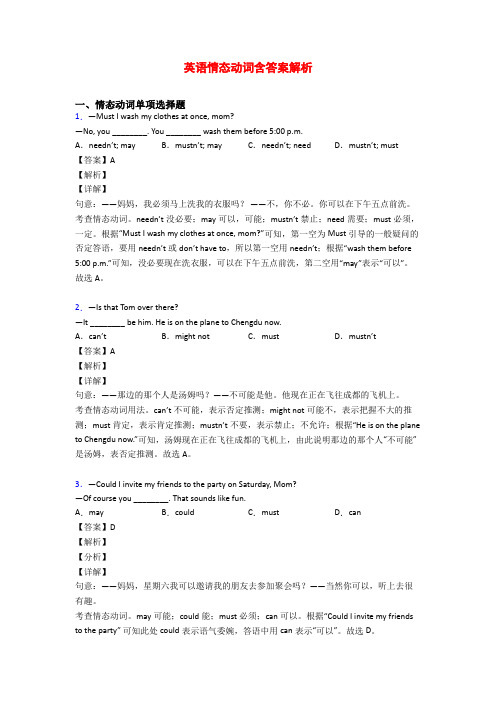
英语情态动词含答案解析一、情态动词单项选择题1.—Must I wash my clothes at once, mom?—No, you ________. You ________ wash them before 5:00 p.m.A.needn’t; may B.mustn’t; may C.needn’t; need D.mustn’t; must【答案】A【解析】【详解】句意:——妈妈,我必须马上洗我的衣服吗?——不,你不必。
你可以在下午五点前洗。
考查情态动词。
needn’t没必要;may可以,可能;mustn’t禁止;need需要;must必须,一定。
根据“Must I wash my clothes at once, mom?”可知,第一空为Must引导的一般疑问的否定答语,要用needn’t或don’t have to,所以第一空用needn’t;根据“wash them before 5:00 p.m.”可知,没必要现在洗衣服,可以在下午五点前洗,第二空用“may”表示“可以”。
故选A。
2.—Is that Tom over there?—It ________ be him. He is on the plane to Chengdu now.A.can’t B.might not C.must D.mustn’t【答案】A【解析】【详解】句意:——那边的那个人是汤姆吗?——不可能是他。
他现在正在飞往成都的飞机上。
考查情态动词用法。
can’t不可能,表示否定推测;might not可能不,表示把握不大的推测;must肯定,表示肯定推测;mustn’t不要,表示禁止;不允许;根据“He is on the plane to Chengdu now.”可知,汤姆现在正在飞往成都的飞机上,由此说明那边的那个人“不可能”是汤姆,表否定推测。
故选A。
3.—Could I invite my friends to the party on Saturday, Mom?—Of course you ________. That sounds like fun.A.may B.could C.must D.can【答案】D【解析】【分析】【详解】句意:——妈妈,星期六我可以邀请我的朋友去参加聚会吗?——当然你可以,听上去很有趣。
英语情态动词含答案解析
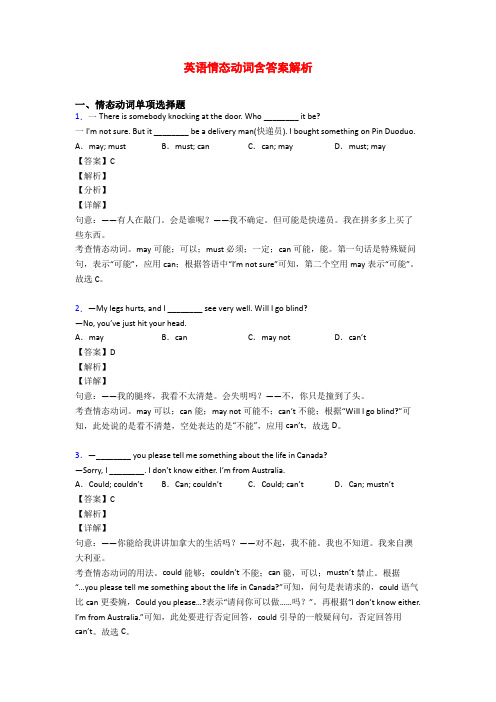
英语情态动词含答案解析一、情态动词单项选择题1.一There is somebody knocking at the door. Who ________ it be?一I'm not sure. But it ________ be a delivery man(快递员). I bought something on Pin Duoduo. A.may; must B.must; can C.can; may D.must; may【答案】C【解析】【分析】【详解】句意:——有人在敲门。
会是谁呢?——我不确定。
但可能是快递员。
我在拼多多上买了些东西。
考查情态动词。
may可能;可以;must必须;一定;can可能,能。
第一句话是特殊疑问句,表示“可能”,应用can;根据答语中“I’m not sure”可知,第二个空用may表示“可能”。
故选C。
2.—My legs hurts, and I ________ see very well. Will I go blind?—No, you’ve just hit your head.A.may B.can C.may not D.can’t【答案】D【解析】【详解】句意:——我的腿疼,我看不太清楚。
会失明吗?——不,你只是撞到了头。
考查情态动词。
may可以;can能;may not可能不;can’t不能;根据“Will I go blind?”可知,此处说的是看不清楚,空处表达的是“不能”,应用can’t,故选D。
3.—________ you please tell me something about the life in Canada?—Sorry, I ________. I don’t know either. I’m from Australia.A.Could; couldn’t B.Can; couldn’t C.Could; can’t D.Can; mustn’t【答案】C【解析】【详解】句意:——你能给我讲讲加拿大的生活吗?——对不起,我不能。
人教新目标中考英语常用语法知识——情态动词知识点总结(含答案解析)

一、选择题1.Please let me ________you if you meet trouble.A.help B.to help C.helps D.helping A解析:A【解析】【详解】句意:如果你遇到困难请让我帮助你。
考查固定搭配。
help动词原形;to help动词不定式;helps动词三单;helping动名词。
分析句子可知,此处用于let sb. do sth.结构中,所以用动词原形,故选A。
2.Don’t ________ your glass too _______.A.fill; full B.fill; filled C.full; full D.full; filled A解析:A【解析】【分析】【详解】句意:不要把你的杯子倒得太满。
考查动词和形容词辨析。
fill填充,动词;full满的,形容词。
本句是否定祈使句,前空需用动词,full是形容词,可排除CD两项。
后句too (太)是形容词,修饰形容词或副词。
根据句意语境,可知选A。
3.Don’t________ in the classroom. It’s important ________ quiet when you study. A.talk, keep B.to talk, keep C.talk, to keep D.to talk, to keep C 解析:C【解析】【详解】句意:不要在教室里交谈。
当你学习的时候保持安静是重要的。
talk交谈,原形;to talk交谈,动词不定式;keep保持;原形;to keep保持,动词不定式。
第一空是否定祈使句,其结构是Don’t+动词原形。
排除BD;It’s important+to do sth.表示做某事是重要的。
排除A。
根据题意,故选C。
【点睛】祈使句的否定结构是以“Don”t+动词原形”开头.例如:Don”t go there,please.请别去那儿.Don”t be late.不要迟到.4.Mike, __________ make any noise, your father is sleeping.A.not B.don't C.won't D.can't B解析:B【解析】【详解】句意:麦克,不要吵闹,你父亲正在睡觉。
英语情态动词专题练习(及答案)含答案

英语情态动词专题练习(及答案)含答案一、选择题1.— Zoe, what do you think is the greatest advantage of shopping online?— At least I ______ spend much time going from shop to shop.A.shouldn’t B.can’t C.needn’t D.mustn’t2.To my joy, we_________ go to the bank. Mary has lent us some money.A.shouldn’t B.needn’t C.couldn’t D.wouldn’t 3.—Hurry up, Jack! Let’s cross the road as fast as possible.—No, you ________. Don’t you see the light is still red?A.couldn’t B.wouldn’t C.mustn’t D.needn’t 4.—The high school entrance examination is coming!— Yes, our teacher tells us we ________ be too careful while taking exams.A.mustn’t B.shouldn’t C.needn’t D.can’t5.We shouldn’t throw any objects from the building. Even a small object ________ cause serious injuries or death, when dropped from a great height.A.must B.should C.may D.need6.Our Chemistry teacher always tells us we ________ be too hardworking before the exams. A.mustn’t B.shouldn’t C.needn’t D.can’t 7.—Dad, must we wait until the light becomes green?—Yes, I am afraid we ________. That’s the traffic rule.A.may B.can C.have to D.need8.—________ you give me a hand? I can’t put up the poster by myself.—No problem.A.Could B.Should C.Need D.Must 9.Exercise is helpful but it ________ be regular (规律的) exercise.A.must B.may C.can D.need10.You'd better __________ hard from now on, __________ you will fail the exam. A.work; and B.working; or C.working; and D.work; or 11.—Where is Tom? I am considering ________ him about the result of the exam.—Oh. You ________. He has known it already.A.to tell; can't B.telling; needn't C.tell; mustn't D.told; shouldn't 12.It’s of great importance to protect the environment. Each of us ________ take an active part in it.A.can B.may C.would D.should13.If you buy your mum an iRobot floor cleaner, she ________ sweep the floor every day. A.can’t B.mustn’t C.needn’t D.shouldn’t 14.—Who’s singing next door? Is it Miss Wang?—It ________ be her. She’s having the board meeting.A.can’t B.shouldn’t C.mustn’t D.needn’t15.The boy is very brave.I ________ he ________ the tall tree.A.dare say; dares to climbB.dare to say; dare climbingC.dare saying; dares climbD.dare to say; dares climbed16.—The high school entrance examination is coming!—Yes, our teacher tells us we _______ be too careful while taking exams.A.mustn't B.shouldn't C.needn't D.can't17.---Will you be back early this evening?---Yes, but I ________ be a little late. Our boss sometimes has extra work for us.A.may B.must C.need D.will 18.—Amy, I hear you've got many foreign coins._______ I have a look?—Of course, I'll fetch them for you.A.May B.MustC.Should D.Need19.When I was young, my father ___________ take me to climb the hill which was not far from our house.A.may B.must C.would D.should20.You ______ pay too much attention to your pronunciation, as it is so important in the oral (口头的) test.A.shouldn’t B.mustn’t C.can’t D.needn’t 21.—Shall we go camping this summer holiday?—Nothing________be better.A.should B.could C.must D.may 22.—Would you please________in that way? That’s not s afe!—Sorry. I won’t do it any more.A.not driving B.not to drive C.no driving D.not drive 23.Think twice before making a decision, or you __________ get into trouble.A.may B.can't C.shouldn't D.mustn't 24.Don’t cross the road until the traffic lights tur n green. A car_______hit you.A.need B.may C.should D.must25.When you visit a museum, some instructions should ________ and we’d better not________ them.A.pay attention to; be against B.be paid attention; againstC.be paid attention to; against D.be paid attention to; be against 26.—Seventy dollars for such a dress! You ________ be joking!—I’m serious. It’s made of silk from Hangzhou.A.must B.need C.will D.can27.—Who is singing next door? It sounds like a young girl’s voice.—It _________ be Jane. But she seldom sings English songs.A.need B.must C.may D.can28.To avoid ________, we’d better ________ the parents’ meeting online.A.gather; hold B.gathering; hold C.gather; holding D.to gather; to hold 29.—I must go to school today, ________?—No, you ________.You can go as soon as you get well.A.mustn’t I;needn’t B.needn’t I;needn’tC.mustn’t I;mustn’t D.needn’t I;mustn’t30.—How do you like my new dress?—Well, if I ________ say, it is not suitable for you.A.may B.must C.have to D.should 31.— Excuse me, could you tell me where the Nanjing Brocade Museum is?—Go along this road for five minutes. You ________ miss it. It’s a huge building. A.mustn’t B.can’t C.needn’t D.shouldn’t 32.—Must the children leave at six tomorrow morning?—No, they _______. They can have more time to get ready for the trip.A.can’t B.needn’t C.mustn’t D.may not 33.—Why didn’t you tell it to me earlier?— Why ________ I? I want to have my own secret.A.can B.may C.should D.shall34.—Is that Mr Zhou?—It ________ be him. He has gone to Beijing.A.can B.may C.can’t D.shouldn’t 35.Most young people like shopping online because they ________ spend much time going from shop to shop.A.needn’t B.can’t C.mustn’t D.shouldn’t 36.—Is it usually warm in Yancheng in May?—Yes. But it _______ be rather cold sometimes.A.must B.should C.would D.can37.—Do we have to finish this today?—Yes, you ________ . Today is the last day.A.would B.may C.can D.must 38.—Will dad arrive home at 6 o’clock to have dinner with us this evening?— I think he will, but he ________ not. Sometimes he works extra hours.A.can B.must C.need D.may39.—Is it really necessary for me to go shopping with a mask on?—I’m afraid you ________ in public. It is not only to protect yourself but also to protect others. A.must B.should C.can D.need 40.Cars ________ give way to walkers on some roads in Binhai, or the drivers will be fined. A.may B.will C.can D.must 41.—Could you tell me how to renew the library books?—With pleasure. You ________ come to our desk every time. It’s easier to renew them online. A.can’t B.mustn’t C.needn’t D.shouldn’t 42.For the safety of the passengers, objects like guns ________ be carried on board.A.may not B.needn’t C.might not D.mustn’t 43.—The article says that a person’s animal sign decides his personality.—You ________ read it for fun, but don’t believe in that.A.can B.must C.shouldn’t D.needn’t 44.—Mum, I bought some strawberries on my way home.—Oh, you’re so sweet. But the strawberries ________ be put into the fridge for freshness. A.must B.can C.may D.need45.—In China, many students have to stay up late to do their homework.—No worries. The government has realized the problem. I’m sure there ________ be good news soon.A.can B.should C.must D.need46.—________ I see your ID card? We have to check your personal information.—Sure. Here you are.A.May B.Need C.Should D.Must47.—I don’t care what people think.—Well, you _______ . Some opinions are worth weighing.A.should B.might C.could D.would48.You ________ drive after drinking alcohol(酒). It’s against the law.A.mustn’t B.needn’t C.couldn’t D.wouldn’t49.—I think they are enough. We ________ make so many chairs.—I don’t think so. Because nearly a quarter of them need ________.A.don’t need to; mending B.needed; to be mendedC.don’t ne ed; mend D.need; to mend50.—Shall I tell him the change of the time right now?—I’m afraid you ________, otherwise he will be late for the meeting.A.can B.may C.must D.need【参考答案】***试卷处理标记,请不要删除一、选择题1.C解析:C【详解】句意:——佐伊,你认为网上购物最大的优势是什么?——至少我不需要花很多时间逛商店。
英语情态动词含答案解析
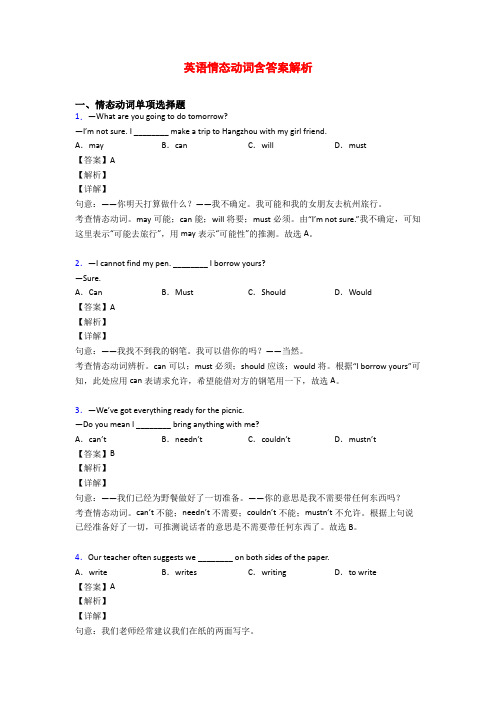
英语情态动词含答案解析一、情态动词单项选择题1.—What are you going to do tomorrow?—I’m not sure. I ________ make a trip to Hangzhou with my girl friend.A.may B.can C.will D.must【答案】A【解析】【详解】句意:——你明天打算做什么?——我不确定。
我可能和我的女朋友去杭州旅行。
考查情态动词。
may可能;can能;will将要;must必须。
由“I’m not sure.”我不确定,可知这里表示“可能去旅行”,用may表示“可能性”的推测。
故选A。
2.—I cannot find my pen. ________ I borrow yours?—Sure.A.Can B.Must C.Should D.Would【答案】A【解析】【详解】句意:——我找不到我的钢笔。
我可以借你的吗?——当然。
考查情态动词辨析。
can可以;must必须;should应该;would将。
根据“I borrow yours”可知,此处应用can表请求允许,希望能借对方的钢笔用一下,故选A。
3.—We’ve got everything ready for the picnic.—Do you mean I ________ bring anything with me?A.can’t B.needn’t C.couldn’t D.mustn’t【答案】B【解析】【详解】句意:——我们已经为野餐做好了一切准备。
——你的意思是我不需要带任何东西吗?考查情态动词。
can’t不能;needn’t不需要;couldn’t不能;mustn’t不允许。
根据上句说已经准备好了一切,可推测说话者的意思是不需要带任何东西了。
故选B。
4.Our teacher often suggests we ________ on both sides of the paper.A.write B.writes C.writing D.to write【答案】A【解析】【详解】句意:我们老师经常建议我们在纸的两面写字。
(完整版)情态动词用法及其练习与答案
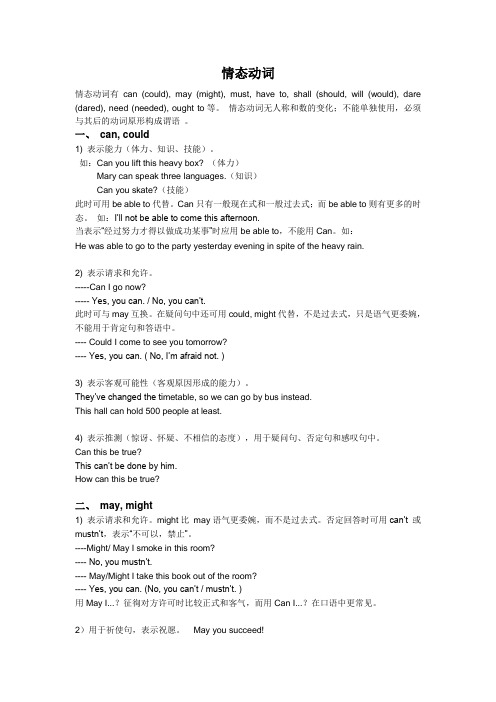
情态动词情态动词有can (could), may (might), must, have to, shall (should, will (would), dare (dared), need (needed), ought to等。
情态动词无人称和数的变化;不能单独使用,必须与其后的动词原形构成谓语。
一、can, could1) 表示能力(体力、知识、技能)。
如:Can you lift this heavy box? (体力)Mary can speak three languages.(知识)Can you skate?(技能)此时可用be able to代替。
Can只有一般现在式和一般过去式;而be able to则有更多的时态。
如:I’ll not be able to come this afternoon.当表示“经过努力才得以做成功某事”时应用be able to,不能用Can。
如:He was able to go to the party yesterday evening in spite of the heavy rain.2) 表示请求和允许。
-----Can I go now?----- Yes, you can. / No, you can’t.此时可与may互换。
在疑问句中还可用could, might代替,不是过去式,只是语气更委婉,不能用于肯定句和答语中。
---- Could I come to see you tomorrow?---- Yes, you can. ( No, I’m afraid not. )3) 表示客观可能性(客观原因形成的能力)。
They’ve changed the ti metable, so we can go by bus instead.This hall can hold 500 people at least.4) 表示推测(惊讶、怀疑、不相信的态度),用于疑问句、否定句和感叹句中。
九年级人教版英语情态动词用法总结(完整)及解析

九年级人教版英语情态动词用法总结(完整)及解析一、选择题1.-Do you mind telling me how to use this function? - . It’s easy. Just double-click on the “Pencil” icon.A.No, not at all B.Of course, I doC.Yes, I do D.Yes, I don’t2.—Are you going to offer some masks and alcohol wet wipes (酒精湿巾) to the people in the village?—________ They are in great need of these things.A.What a shame! B.Why not? C.Why me? D.What's wrong? 3.—I plan to find a part-time job in the coming summer holiday.—________ It will be a totally different experience.A.See you later. B.You’d better not.C.I’m sorry to know that.D.That sounds like fun.4.— I find it difficult to fall asleep before exams. Could you help me?— ___________. We have helped many students with similar problems.A.No problem B.Come on C.Well done D.What a pity 5.—I’m afraid I can’t get good grades in the P.E. exam.—________! Train as much as you can.A.Well done B.Keep trying C.Enjoy yourself D.Be careful 6.— I am so sorry to keep you waiting for such a long time.— ________.A.Please shut up B.It’s your mistake C.It doesn’t matter D.Don’t explain it 7.—I’m afraid I can’t do well in the sports meeting. I might let my classmates down.—_______. You don’t need to push yourself too hard.A.It’s a pleasure B.What a pity C.Take it easy D.Y ou’re welcome 8.—Amazingly, I've managed to finish the project by myself.—___________I told you it was easyA.With pleasure. B.Guess what? C.There you are! D.It doesn’t matter 9.–This box is too heavy for me to carry upstairs.–__________A.You may ask for help B.I’ll give you a handC.Please do me a favor D.I’d come to help10.—I’m sorry. That wasn’t of much help.— ________. In fact, it was most helpful.A.Thanks anyway B.It doesn’t matter C.Of course not D.Sure it was 11.—It’s been a wonderful p arty. Thank you very much?—- ________________.A.With pleasure B.No , thanks C.It’s OK D.I’m glad you enjoyed it .12.—Liz, I’d like to take a week’s holiday.—________. We’re as busy as a bee.A.Go ahead B.With pleasure C.Forget it D.That’s right 13.— What do you think of the movie Mr. Bea ?—____. It’s very funny.A.I can’t stand it .B.I don’t mind it C.I love it. D.I hate it. 14.—Don’t forget to keep safe distance (距离) at least one meter, Mike!—________A.Sorry, I won’t.B.No, I can’t do it.C.Not at all. D.I hope not. 15.—Lucy, can you help me with my history?—________. I am good at it.A.With pleasure B.I’m afraid not C.Sorry, I can’t D.No way 16.—I have got a new job as a presenter in the Wenzhou Radio Station!—________.A.Come on B.Good idea C.Congratulations D.All right 17.—TV says there will be a heavy rain tomorrow.—________. I planned to go climbing with my friend.A.Bad luck B.I hope so C.Good idea D.I don’t mind 18.—Do you like cartoons or scary movies?—_______. They can cheer me up.A.Yes, I do B.No, I don't C.Cartoons D.Scary movies 19.—You seem so happy today, Jack.—________? I won the first prize in the singing competition yesterday.A.So what B.How come C.Guess what D.Why not 20.—Susan, will you please go and empty that drawer?— _________ ?A.What for B.What is it C.How is it D.How come 21.—I’m going hiking this afternoon. Would you like to go with me?—______, but I must finish my homework first.A.Sorry, I don’t B.That’s right C.I’d love to D.Not at all 22.—Jim seems to be in low spirits. ________?—No one liked his plan. All his efforts were useless.A.Guess what B.What about him C.So what D.What happened 23.—________. Where’s the nearest supermarket?—Oh, it’s about 300 meters away, next to a park.A.Thank you B.Excuse me C.Come on D.That’s OK 24.—Anna, can you come to my party tomorrow night?—_________, but I have to stay at home because of the flu.A.I’d love to B.Sounds good C.That’s OK D.Why not 25.-Do you think the rain will stop tomorrow?-_____. It has rained for four days. It’s too wet everywhere.A.I hope not B.I don’t think soC.Don’t worry D.I hope so26.—I’ll have a chemistry exam tomorrow.—________!A.Well done B.Congratulations C.You’re welcome D.Good luck 27.—Would you mind if I open the window?—_______.We need fresh air.A.Not at all B.Yes, of course C.You’d better not D.That’s all right 28.—I find it really unwise to go travelling during May Day holiday.—________! Wherever you go, it’s crowded with cars and people.A.Not exactly B.Forget it C.You said it D.It depends 29.—Only those who have a lot in common can get along well.—________ Opposites sometimes attract.A.I think so. B.I don’t think so.C.I don’t care.D.I hope so. 30.—Only those who have a lot in common can get along well.—________. Opposites sometimes attract.A.I think so B.I don’t think so C.I don’t care D.I hope so 31.— May I have a look at the newspaper China Daily?— Certainly. ________A.Thank you. B.It’s a pity.C.Here you are. D.I’d like to. 32.—Hi, everybody! Here is the music.—________. Let’s dance to the music.A.That’s no good B.Here we go C.That’s a shame D.Have a good time 33.— Do you think Steve will pass the exam this time?— ________! He spends most of his time playing games on the phone.A.Promise B.No way C.Well done D.No problem 34.—________!—Yes. It sounds gentle and relaxing.A.How good the vegetable soup is B.How exciting the storybook isC.What nice music Ann is playing D.What a beautiful flower Jim keeps 35.—How about buying that coat?—________. It’s too expensive. I can’t afford it.A.That sounds good B.No way C.Good idea D.What a pity 36.—I wonder if Tenny is doing well in her new school.—________. She is old enough to look after herself well.A.You’re welcome B.Good luck C.It’s a pity D.No need to worry 37.—Our family will go to Hangzhou for a holiday this summer.—________.A.Well done B.I am glad to hear thatC.Best wishes to you D.Have fun38.— Wow, what a good smell! Can I have a piece of cake?— ________A.No way. B.Good idea! C.HeIp yourself. D.What a pity! 39.—Can you tell me how to get to the park?—________—Thank you all the same.A.Show me the map, please.B.Certainly. It’s opposite the museum.C.Sorry, I don’t know. I’m a stranger here.D.Sure. Turn right and go along Rock Road.40.— Would you mind my turning on the TV? The New Year concert has just begun.— ________. Just go ahead.A.Please don’t B.Better not C.Of course not D.I’m afraid not 41.—I prefer to chat online. I’ve got to know many friends on the Internet.—________. Few of them would become your real friends.A.I can’t agree more B.I’m pleased to know thatC.That’s for sure D.That’s not the case42.—We’ll study in different schools next term. I hope you’ll enjoy your time in the new school!—________A.I’ll take your advice. B.The same to you. C.Congratulations!D.It doesn’t matter.43.— The movie Lost in Russia sends a message about the importance of family.— ________. It reminds me of my parents.A.I hope so B.That’s all right C.You bet D.I don’t think so 44.—Michael was late for Mr. Smith’s ch emistry class this morning.—________? As far as I know, he never came late to class.A.So what B.Why not C.How come D.Who cares 45.— Are you feeling any better now after taking the medicine?—________. I’m feeling even worse.A.You got it B.Never mind C.Sorry to hear that D.Quite the opposite 46.— I guess you want to play tennis in the park this afternoon.—_______. That’s exactly what I was thinking just now.A.It’s up to you B.Of course not C.You read my mind D.It’s hard to say 47.—Can I look at the menu for a few more minutes before I decide?—Of course. ________, Sir.A.Make yourself at home B.Enjoy yourself C.It doesn’t matterD.Take your time48.—I’m so sorry to keep you waiting for me so long.— ________!A.With pleasure. B.Don’t say so C.I don’t think so D.It doesn’t matter 49.—I just got a message from Ms. Yang and she said she would come to our meeting this afternoon.— She always has good ideas.A.Why not? B.What a pity! C.Time is up. D.That’ll be very nice. 50.—I’ll be away on a busin ess trip. Would you mind looking after my cat?—Not at all. ________.A.It’s my pleasure B.I’d rather not.C.I’d like it.D.With pleasure.【参考答案】***试卷处理标记,请不要删除一、选择题1.A【解析】本题考查的是情景反应.根据意思可知答案为A解析:A【解析】本题考查的是情景反应.根据意思可知答案为A2.B【详解】句意:——你准备给村里的人提供口罩和酒精湿巾吗?——为什么不呢?他们非常需要这些东西。
人教版中考英语专项训练情态动词专题(含答案)
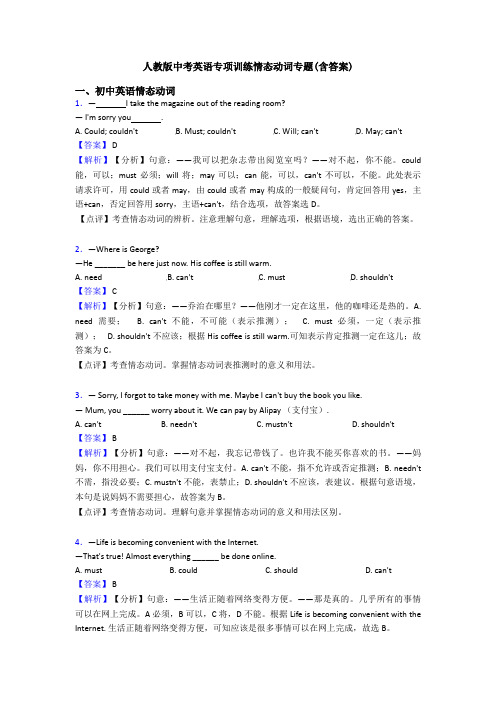
人教版中考英语专项训练情态动词专题(含答案)一、初中英语情态动词1.— I take the magazine out of the reading room?— I'm sorry you .A. Could; couldn'tB. Must; couldn'tC. Will; can'tD. May; can't【答案】 D【解析】【分析】句意:——我可以把杂志带出阅览室吗?——对不起,你不能。
could 能,可以;must必须;will将;may可以;can能,可以,can't不可以,不能。
此处表示请求许可,用could或者may,由could或者may构成的一般疑问句,肯定回答用yes,主语+can,否定回答用sorry,主语+can't,结合选项,故答案选D。
【点评】考查情态动词的辨析。
注意理解句意,理解选项,根据语境,选出正确的答案。
2.—Where is George?—He _______ be here just now. His coffee is still warm.A. needB. can'tC. mustD. shouldn't【答案】 C【解析】【分析】句意:——乔治在哪里?——他刚才一定在这里,他的咖啡还是热的。
A. need需要; B. can't 不能,不可能(表示推测); C. must 必须,一定(表示推测); D. shouldn't不应该;根据His coffee is still warm.可知表示肯定推测一定在这儿;故答案为C。
【点评】考查情态动词。
掌握情态动词表推测时的意义和用法。
3.— Sorry, I forgot to take money with me. Maybe I can't buy the book you like.— Mum, you ______ worry about it. We can pay by Alipay (支付宝).A. can'tB. needn'tC. mustn'tD. shouldn't【答案】 B【解析】【分析】句意:——对不起,我忘记带钱了。
英语情态动词含答案解析
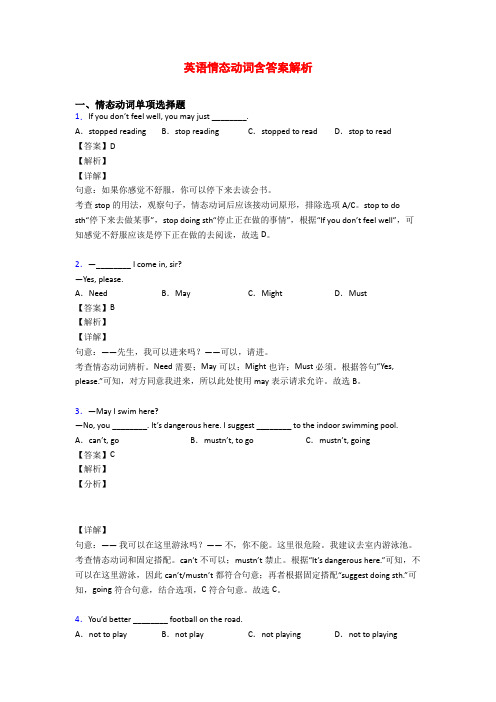
英语情态动词含答案解析一、情态动词单项选择题1.If you don’t feel well, you may just ________.A.stopped reading B.stop reading C.stopped to read D.stop to read【答案】D【解析】【详解】句意:如果你感觉不舒服,你可以停下来去读会书。
考查stop的用法,观察句子,情态动词后应该接动词原形,排除选项A/C。
stop to dosth“停下来去做某事”,stop doing sth“停止正在做的事情”,根据“If you don’t feel well”,可知感觉不舒服应该是停下正在做的去阅读,故选D。
2.—________ I come in, sir?—Yes, please.A.Need B.May C.Might D.Must【答案】B【解析】【详解】句意:——先生,我可以进来吗?——可以,请进。
考查情态动词辨析。
Need需要;May可以;Might也许;Must必须。
根据答句“Yes, please.”可知,对方同意我进来,所以此处使用may表示请求允许。
故选B。
3.—May I swim here?—No, you ________. It’s dangerous here. I suggest ________ to the indoor swimming pool. A.can’t, go B.mustn’t, to go C.mustn’t, going【答案】C【解析】【分析】【详解】句意:——我可以在这里游泳吗?——不,你不能。
这里很危险。
我建议去室内游泳池。
考查情态动词和固定搭配。
can’t不可以;mustn’t禁止。
根据“It’s dangerous here.”可知,不可以在这里游泳,因此can’t/mustn’t都符合句意;再者根据固定搭配“suggest doing sth.”可知,going符合句意,结合选项,C符合句意。
初中英语情态动词详细用法归纳(含练习及答案)
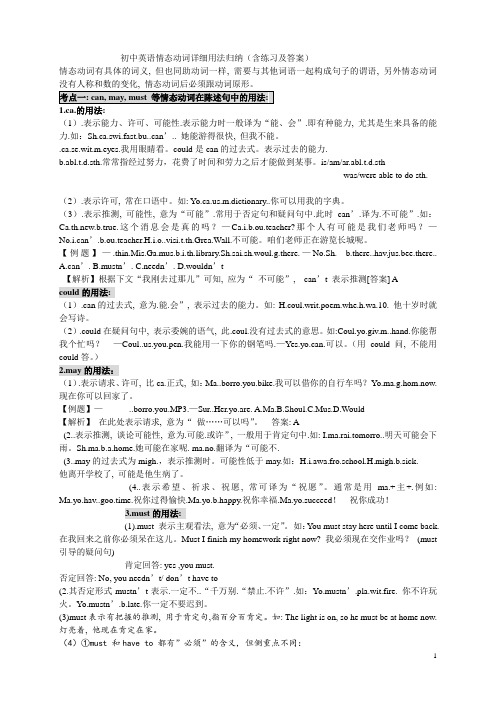
初中英语情态动词详细用法归纳(含练习及答案)情态动词有具体的词义, 但也同助动词一样, 需要与其他词语一起构成句子的谓语, 另外情态动词没有人称和数的变化, 情态动词后必须跟动词原形。
1.ca.的用法:(1).表示能力、许可、可能性.表示能力时一般译为“能、会”.即有种能力, 尤其是生来具备的能力.如:Sh.ca.swi.fast.bu..can’.. 她能游得很快, 但我不能。
.ca.se.wit.m.eyes.我用眼睛看。
could是can的过去式。
表示过去的能力.b.abl.t.d.sth.常常指经过努力,花费了时间和劳力之后才能做到某事。
is/am/ar.abl.t.d.sthwas/were able to do sth.(2).表示许可, 常在口语中。
如: .m.dictionary..你可以用我的字典。
(3).表示推测, 可能性, 意为“可能”.常用于否定句和疑问句中.此时can’.译为.不可能”.如:Ca.th.new.b.true.这个消息会是真的吗?—Ca.i.b.ou.teacher?那个人有可能是我们老师吗?—No.i.can’.b.ou.teacher.H.i.o..visi.t.th.Grea.Wall.不可能。
咱们老师正在游览长城呢。
【例题】—.thin.Mis.Ga.mus.b.i.th.library.Sh.sai.sh.woul.g.there.—No.Sh.__b.there..hav.jus.bee.there..A.can’.B.mustn’.C.needn’.D.wouldn’t【解析】根据下文“我刚去过那儿”可知, 应为“不可能”, can’t 表示推测[答案] Acould的用法:(1).can的过去式, 意为.能.会”, 表示过去的能力。
如: H.coul.writ.poem.whe.h.wa.10. 他十岁时就会写诗。
(2).could在疑问句中, 表示委婉的语气, 此.coul.没有过去式的意思。
英语情态动词含答案解析
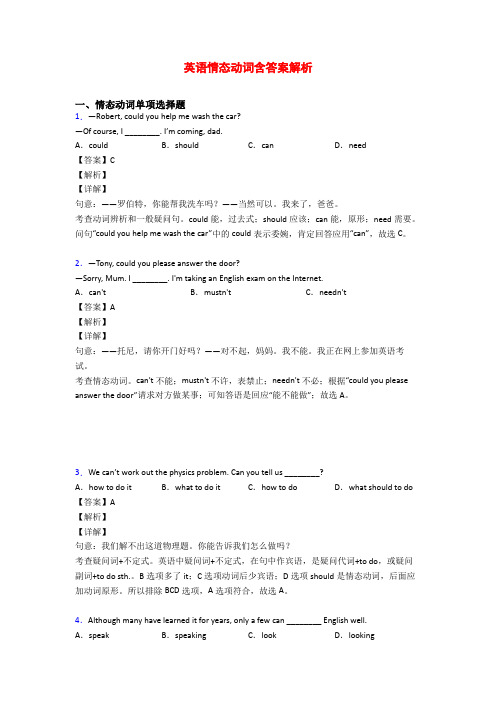
英语情态动词含答案解析一、情态动词单项选择题1.—Robert, could you help me wash the car?—Of course, I ________. I’m coming, dad.A.could B.should C.can D.need【答案】C【解析】【详解】句意:——罗伯特,你能帮我洗车吗?——当然可以。
我来了,爸爸。
考查动词辨析和一般疑问句。
could能,过去式;should应该;can能,原形;need需要。
问句“could you help me wash the car”中的could表示委婉,肯定回答应用“can”,故选C。
2.—Tony, could you please answer the door?—Sorry, Mum. I ________. I'm taking an English exam on the Internet.A.can't B.mustn't C.needn't【答案】A【解析】【详解】句意:——托尼,请你开门好吗?——对不起,妈妈。
我不能。
我正在网上参加英语考试。
考查情态动词。
can't 不能;mustn't 不许,表禁止;needn't不必;根据“could you please answer the door”请求对方做某事;可知答语是回应“能不能做”;故选A。
3.We can’t work out the physics problem. Can you tell us ________?A.how to do it B.what to do it C.how to do D.what should to do 【答案】A【解析】【详解】句意:我们解不出这道物理题。
你能告诉我们怎么做吗?考查疑问词+不定式。
英语中疑问词+不定式,在句中作宾语,是疑问代词+to do,或疑问副词+to do sth.。
情态动词用法练习题及答案(最新最全)

情态动词用法练习题及答案(最新最全)首先它是动词,而且不同于行为动词,行为动词表示的是可以通过行为来表达的动作(如写,读,跑),而情态动词只是表达的一种想法(如能,也许,敢)。
用法是:情态动词+行为动词原形例句:IcanreadthissentenceinEnglish.我能用英语读这句话。
情态动词是一种本身有一定的词义,表示说话人的情绪,态度或语气的动词,但不能单独作谓语,只能和其他动词原形构成谓语。
Wecanbethereontimetomorrow.我们明天能按时去那儿。
MayIhaveyourname?我能知道你的名字吗?Shallwebeginnow?我们现在就开始吗?Youmustobeytheschoolrules.你必须遵守校规。
情态动词数量不多,但用途广泛,主要有下列:can(could),may(might),must,need,oughtto,dare(dared),shall( should),will(would),have,hadbetter.情态动词还有一个很重要的用法,即情态动词表推测--用法小结(一)情态动词表推测的三种句式1.在肯定句中一般用must(一定),could(可能),might/may(也许,或许)。
e.g:(1)Hemust/can/may,mightknowtheanswertothisquestion.他一定/可能/也许知道这个问题的答案。
(2)Itiscoldintheroom.Theymusthaveturnedofftheheating.屋里很冷,他们肯定把暖气关了。
2.否定句中用can''t/couldn''t(不可能),maynot/mightnot(可能不)。
e.g:(1)Itcan''t/couldn''tbetheheadmaster.HehasgonetoAmeri ca.这不可能是校长,他去美国了。
人教版英语英语情态动词的用法大全含答案

人教版英语英语情态动词的用法大全含答案一、初中英语情态动词1.——Do you have any plans for this summer vacation? ——I'm not sure. I ___ take a trip to Taiwan.A. mustB. needC. mayD. should【答案】C【解析】【分析】句意:一今天暑假你有什么计划吗?一我还不确定。
我可能去台湾去旅行。
A.必须,一定;B.需要,必要;C.可能;D.应该。
根据句中I'm not sure可知,说话人还没有确定的计划,所以这只是一个可能,应选C。
2.—Where is Monica? I can't find her anywhere.—She be in the library. She loves reading books when she is free.A. mustB. needC. can't【答案】 A【解析】【分析】句意:——莫妮卡在哪?我到处都找不到她。
——她肯定在图书馆,她喜欢空闲时看书。
A肯定,肯定句中表示推测,B需要,C不可能,否定句中表示推测,根据 She loves reading books when she is free ,可知是肯定句表示推测,故选A。
【点评】考查情态动词,注意情态动词表推测的用法。
3.You be tired after walking for such a long time. Sit down and have a rest.A. canB. can'tC. mustn'tD. must【答案】 D【解析】【分析】句意:走了这么长时间你一定很累了。
坐下休息一下吧。
can能,能够,can't不能,对事物进行否定推测;mustn't一定不是,禁止,must一定,对事物进行肯定推测,根据after walking for such a long time,可以肯定你一定很累,所以是进行肯定推测,情态动词使用must,故选D。
英语情态动词含答案解析
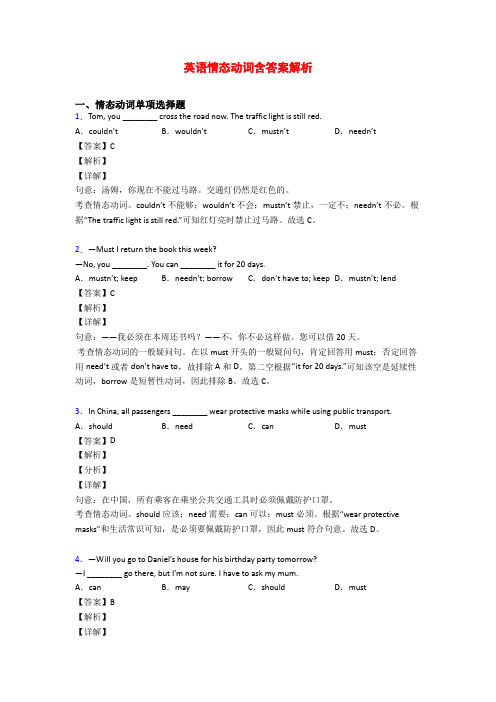
英语情态动词含答案解析一、情态动词单项选择题1.Tom, you ________ cross the road now. The traffic light is still red.A.couldn’t B.wouldn’t C.mustn’t D.needn’t【答案】C【解析】【详解】句意:汤姆,你现在不能过马路。
交通灯仍然是红色的。
考查情态动词。
couldn’t不能够;wouldn’t不会;mustn’t禁止,一定不;needn’t不必。
根据“The traffic light is still red.”可知红灯亮时禁止过马路。
故选C。
2.—Must I return the book this week?—No, you ________. You can ________ it for 20 days.A.mustn’t; keep B.needn’t; borrow C.don’t have to; keep D.mustn’t; lend【答案】C【解析】【详解】句意:——我必须在本周还书吗?——不,你不必这样做。
您可以借20天。
考查情态动词的一般疑问句。
在以must开头的一般疑问句,肯定回答用must;否定回答用need’t或者don’t have to,故排除A和D。
第二空根据“it for 20 days.”可知该空是延续性动词,borrow是短暂性动词,因此排除B。
故选C。
3.In China, all passengers ________ wear protective masks while using public transport. A.should B.need C.can D.must【答案】D【解析】【分析】【详解】句意:在中国,所有乘客在乘坐公共交通工具时必须佩戴防护口罩。
考查情态动词。
should应该;need需要;can可以;must必须。
根据“wear protective masks”和生活常识可知,是必须要佩戴防护口罩,因此must符合句意。
英语情态动词讲解及练习(附答案)

英语情态动词讲解及练习(附答案)情态动词讲解定义:情态动词表示说话人对动作的态度,比如:需要,可能,意愿,猜测或者怀疑等等。
情态动词本身有一定意思,但不完全,不能单独作谓语,必须与动词原形连用。
否定句中,在情态动词后面加not。
情态动词有:must, shall, should, had better 词形无变化can(could), may(might), will(would) 词形有变化need既可以是情态动词,也可以是实义动词,具有双重性。
一、can 表示“能,会”,否定为:can’t = can not = cannot 其过去式为:could→couldn’t(1)表示会做某事,有能力做某事。
意思= be able toe.g. He can speak English, but he can’t speak Japanese.= He is able to speak English, but he isn’t able to speak Japanese.I could smile but I couldn’t speak w hen I was 2 months old.= I was able to smile but I wans’t able to speak when I was 2 months old.区别:① can只用于现在时和过去时(could), be able to 可用于各种时态。
e.g. They will be able to tell you the news soon.Mingming has been able to count numbers.② be able to 不与can连用,但可以和其他情态动词或助动词连用。
e.g. He may be able to speak English very well some day in the future.He may can speak…………………………………………………..He can be able to speak……………………………………………..(2)用于征求意见——Can /Could /May /Might I(we) do sth?——Yes, you can/may. / Of course you can.——No(Sorry), you can’t. /mustn’t.注意:①此处的could和might都不表示过去,只是语气上的委婉,不用作回答。
英语情态动词含答案解析
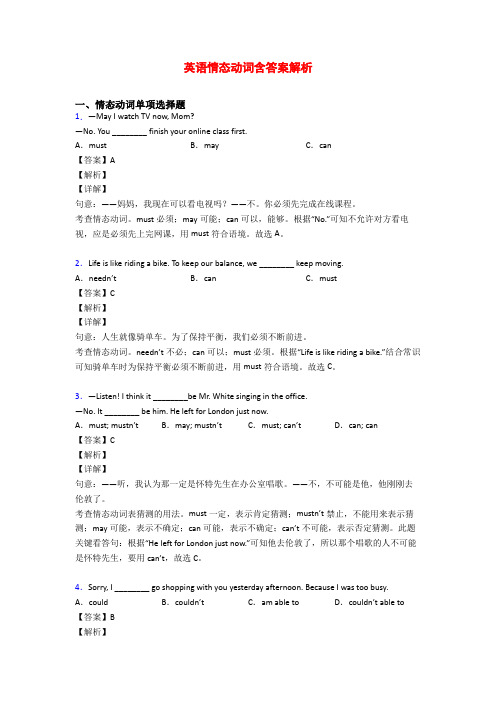
英语情态动词含答案解析一、情态动词单项选择题1.—May I watch TV now, Mom?—No. You ________ finish your online class first.A.must B.may C.can【答案】A【解析】【详解】句意:——妈妈,我现在可以看电视吗?——不。
你必须先完成在线课程。
考查情态动词。
must必须;may可能;can可以,能够。
根据“No.”可知不允许对方看电视,应是必须先上完网课,用must符合语境。
故选A。
2.Life is like riding a bike. To keep our balance, we ________ keep moving.A.needn’t B.can C.must【答案】C【解析】【详解】句意:人生就像骑单车。
为了保持平衡,我们必须不断前进。
考查情态动词。
needn’t不必;can可以;must必须。
根据“Life is like riding a bike.”结合常识可知骑单车时为保持平衡必须不断前进,用must符合语境。
故选C。
3.—Listen! I think it ________be Mr. White singing in the office.—No. It ________ be him. He left for London just now.A.must; mustn’t B.may; mustn’t C.must; can’t D.can; can【答案】C【解析】【详解】句意:——听,我认为那一定是怀特先生在办公室唱歌。
——不,不可能是他,他刚刚去伦敦了。
考查情态动词表猜测的用法。
must一定,表示肯定猜测;mustn’t禁止,不能用来表示猜测;may可能,表示不确定;can可能,表示不确定;can’t不可能,表示否定猜测。
此题关键看答句:根据“He left for London just now.”可知他去伦敦了,所以那个唱歌的人不可能是怀特先生,要用can’t,故选C。
- 1、下载文档前请自行甄别文档内容的完整性,平台不提供额外的编辑、内容补充、找答案等附加服务。
- 2、"仅部分预览"的文档,不可在线预览部分如存在完整性等问题,可反馈申请退款(可完整预览的文档不适用该条件!)。
- 3、如文档侵犯您的权益,请联系客服反馈,我们会尽快为您处理(人工客服工作时间:9:00-18:30)。
人教版英语英语情态动词总结和练习含答案百度文库一、初中英语情态动词1.—Look! The woman at the school gate ______be her headmaster.—No, it ______ be her. She is holding a meeting in the office now.A. must; can'tB. must; mustn'tC. can; needn'tD. may; mustn't【答案】 A【解析】【分析】句意:——看!学校门口的那个妇女一定是她的校长。
——不,不可能是她。
第一空,must表示“一定”;空二,根据She is holding a meeting in the office now. 她现在正在办公室开会,可知,不可能是校长,用can't,表示不可能。
故选A。
【点评】考查情态动词辨析。
注意不同情态动词的用法,注意理解句意。
2.—Where is Monica? I can't find her anywhere.—She be in the library. She loves reading books when she is free.A. mustB. needC. can't【答案】 A【解析】【分析】句意:——莫妮卡在哪?我到处都找不到她。
——她肯定在图书馆,她喜欢空闲时看书。
A肯定,肯定句中表示推测,B需要,C不可能,否定句中表示推测,根据 She loves reading books when she is free ,可知是肯定句表示推测,故选A。
【点评】考查情态动词,注意情态动词表推测的用法。
3.A hard-working man ______ become a great scientist, but a great scientist _______ be a hard-working man.A. can't; canB. may not; mustC. can't; mustD. may not; can【答案】 B【解析】【分析】句意:一个勤奋的人可能不会成为一位伟大的科学家,但是一位伟大的科学家一定是一个勤奋的人。
can't不可能,不会;can可能,能,会;may not 可能不;must 必须,一定;结合句意,可知,第一个空为“可能不”,第二个空为“一定”,故答案为B。
【点评】考查情态动词。
掌握情态动词表推测时的意义和用法。
4.—Shall we meet at the station at 9 a.m.?—In fact we ______. The train ______until 11a.m.A. needn't; will leaveB. needn't; won't leaveC. mustn't; leavesD. mustn't; doesn't leave【答案】 B【解析】【分析】句意:—我们上午9点在车站见面好吗?—事实上我们不需要。
火车直到11点才离开。
needn't情态动词,不需要,没必要;mustn't情态动词,不允许,语气强烈,本题含义只是“不需要”,并没有“禁止、不许”这样强烈的语义。
not...until...,意为“直到...才...”,表示将来发生的事情,所以使用一般将来时态的否定形式won't。
故选:B。
【点评】考查情态动词辨析,固定搭配not...until...。
一般将来时态。
5.Teenagers allowed to drive .A. should not beB. should be notC. not should be【答案】A【解析】【分析】句意:年轻人不应该被允许驾车。
Should是情态动词,其否定表达一般在在后面加副词not,故选A。
【点评】此题考查含有情态动词的被动语态的否定形式。
平时注意记忆情态动词的记忆和用法。
6.You be tired after walking for such a long time. Sit down and have a rest.A. canB. can'tC. mustn'tD. must【答案】 D【解析】【分析】句意:走了这么长时间你一定很累了。
坐下休息一下吧。
can能,能够,can't不能,对事物进行否定推测;mustn't一定不是,禁止,must一定,对事物进行肯定推测,根据after walking for such a long time,可以肯定你一定很累,所以是进行肯定推测,情态动词使用must,故选D。
【点评】此题考查情态动词。
弄清每个情态动词的使用规则,根据句意确定所使用的情态动词。
7.— Is this e-dictionary Jack's?— No, it_______ his. His is much newer.A. can't beB. mustn't beC. may beD. should be【答案】 A【解析】【分析】句意:-这个电子字典是杰克的吗?--不可能是他的,他的更新些。
must,can(could),may(maight)可以表示猜测,must表示肯定猜测,用于肯定句,肯定……,一定……;can’t,表示否定猜测,肯定不……,另外can(could),may(maight),表示可能性猜测,可能……。
根据后文的依据,可知是否定猜测,故选A8.—Who it be that is knocking at the door?—It be father, but I'm not sure.A. call; mustB. can; mayC. must; canD. may; must【答案】 B【解析】【分析】句意:——敲门的人可能是谁呢?——他可能是父亲,但是我不确定。
第一空,can可能,表猜测用语疑问句形式,may是表可能;第二空,根据后面的but I'mnot sure,可知表示不确定的猜测,应填may,故选B。
【点评】此题考查情态动词辨析。
先弄清每个情态动词的使用规则。
根据上下文的联系确定情态动词的使用。
9.The girl riding a horse there be Shirley. Her left leg was badly hurt in an accident yesterday.A. needn'tB. may notC. can'tD. mustn't【答案】C【解析】【分析】句意:那边骑马的女孩不可能是雪莉。
她的左腿在昨天的事故中受了重伤。
A.needn't不必;B. may not不可以;C. can't不可能,表示否定的推测;D. mustn't 不准,不允许,表示禁止。
本题表示否定的推测,不可能:can't。
故选C。
10.Harry's been driving all day—— he be tired.A. needB. canC. shallD. must【答案】 D【解析】【分析】句意:哈利已经开了一整天车了——他一定累了。
根据句意可知,开了一整天车,所以推测他累是一定的。
所以用情态动词must。
故选D。
11.— Dick, ________ I use your e-dictionary? — Yes, sure. ________ you give it to David afteryou use it?A. will; WouldB. may; MightC. can; CouldD. shall; Should【答案】 C【解析】【分析】句意:一Dick我可用一下你的电子词典吗?一当然可以。
在你用完后你能把它给他David吗?根据句意及题干分析第一空表示请求允许,所以可以用may或can;第二空是表示对别人的请求.所以用could表示更加委婉,故选C。
12.—Where is George?—He _______ be here just now. His coffee is still warm.A. needB. can'tC. mustD. shouldn't【答案】 C【解析】【分析】句意:——乔治在哪里?——他刚才一定在这里,他的咖啡还是热的。
A. need需要; B. can't 不能,不可能(表示推测); C. must 必须,一定(表示推测); D. shouldn't不应该;根据His coffee is still warm.可知表示肯定推测一定在这儿;故答案为C。
【点评】考查情态动词。
掌握情态动词表推测时的意义和用法。
13.— I take the magazine out of the reading room?— I'm sorry you .A. Could; couldn'tB. Must; couldn'tC. Will; can'tD. May; can't【答案】 D【解析】【分析】句意:——我可以把杂志带出阅览室吗?——对不起,你不能。
could 能,可以;must必须;will将;may可以;can能,可以,can't不可以,不能。
此处表示请求许可,用could或者may,由could或者may构成的一般疑问句,肯定回答用yes,主语+can,否定回答用sorry,主语+can't,结合选项,故答案选D。
【点评】考查情态动词的辨析。
注意理解句意,理解选项,根据语境,选出正确的答案。
14.You _____ walk too close to the edge of the path because you might fall and hurt yourself.A. mayB. mightC. needn'tD. musn't【答案】 D【解析】【分析】句意:你不能走得太靠近路的边缘,因为你可能跌倒伤害自己。
A. may可以,表允许;B. might可能,表推测;C. needn't不必,指没有必要;D. musn't不能,表示不允许或禁止。
根据句意语境,本句是不允许离路边太近,故选D。
【点评】考查情态动词辨析题。
注意分析句意和词义。
15. Look! The traffic light has turned red. We _____ stop our car.A. canB. can'tC. mustD. mustn't【答案】 C【解析】【分析】句意:看交通灯成了红灯。
